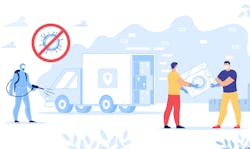Fleet leaders divulge COVID-19 defense strategies
There are more questions than answers surrounding the nation’s economic health and vitality right now. As America tries to “flatten the curve” and also maintain some semblance of a supply chain, people are desperate for information. No one has all the answers, but to illuminate just what is going on right now in the trucking sector, the American Trucking Associations and the Safety Management Council recently offered a webinar on driver safety.
Typically, the information disseminated in ATA webinars is withheld from the general public, but due to the seriousness of the pandemic, the group made the decision to share the contents of the discussion that took place on April 15.
The panel, moderated by Laura McMillan, vice president of training at Instructional Technologies, (which has a free online course for fleets on managing COVID-19 risks) went over how three large fleets, J.B. Hunt, Freymiller and J. Kings Food Service, have responded to the constantly changing landscape on the subjects of sanitation, quarantining, operations and regulations.
Here is what each representative said [with light editing for clarity].
J.B. Hunt: Greer Woodruff, vice president of safety, security and driver personnel
Sanitation:
We've got 19,000 drivers so to try to address the needs of those drivers in a short period of time has been a challenge.
Getting the word out is easy for us to do because we've got a number of different means to communicate, including onboard computers. What was a little bit more of a challenge was securing the personal protective equipment [PPE] and sanitizers gloves, masks, and then getting those to over 400 work reporting locations.
We tried to procure what we could locally with our local management. And then, fortunately, we were able to secure those pretty early on, and so we've distributed over 1.4 million gloves to drivers, over 57,000 18-ounce bottles of hand sanitizers, and a lot of wipes.
Some of our intermodal ramps and some of our dedicated operations, particularly in the Northeast, service New York City. And as we all know, that's been the epicenter, the most hard hit and earliest location that really had a big problem. And our drivers have been really good about being willing to serve the communities in those areas that need the essential supplies we deliver.
Quarantining
One of the things we really wanted to do is ensure that we took away the motivations to come to work if you were ill because of concerns over finances, so we implemented an emergency paid time off [PTO] policy that provided employees up to 80 hours of additional paid time. We set up a system where that's being reported to our HR department, and they are assisting us in determining employees’ likelihood of exposure, the symptoms that they may be displaying, and then helping us document the situation, authorize the emergency PTO, and then track the employees condition.
Operations
A lot of our customers have essential products. And we've seen an increase in demand from those customers for our services, but we also have certain customers that do not have essential goods, and many of them have reduced their shipments or even stopped shipping all together. We shifted those trucks and drivers over to the customers that are shipping essential goods, which allowed us to keep those drivers and assets busy and help the driver continue to earn a paycheck.
Demand for new drivers coming in is down a little bit. We continue to hire drivers, but we're not hiring drivers at the same pace.
Regulatory Changes
Normally when we see hours of service exemptions, as a rule we don’t use them. If a driver gets within 30 minutes of delivery for essential and he feels like he can go, we’ll talk to the driver and approve things.
Freymiller: Bill Woolsey, director of safety
Sanitation:
We’re covering the universal precautions that drivers can be doing to help protect themselves when they go to the trucks stops and rest areas.
We’re getting our drivers supplies they need to help further that cause. A unique challenge for us is we're a centrally located terminal with 600 trucks that are scattered.
We've got the masks coming in and hand sanitizers. We’re breaking those down into smaller packaging for the drivers. They were having to find what they could on their own, and as they were able to get into the terminals, we were able to help supplement that.
At the terminal, we've really ramped up our sanitation practices. We’ve got hand sanitizers around every corner and the expectation is if you come into one of the workspaces, go ahead and sanitize your hands before you touch anything or do any work there.
After hours when there's not a lot of people there, we’re also fogging all of our office environments with a disinfectant that kills the virus and bacteria germs. This went from weekly to daily.
Quarantining
Freymiller drafted what we call our COVID-19 prevention strategy, a document that we've been continuing to update as we learn more about ways to prevent the exposure and ways to better manage our risk.
We have about 20% of our staff working from home and implemented a compensation policy. Workers are tested and quarantined while they wait for results and still paid.
We've had a few drivers who called in said that they feel sick, and we've been able to stop them and repower that load, and help them get to a doctor to get checked out. So far, we've been extremely fortunate that we've had all of the tests come back negative.
We do hire quite a few drivers every week. Everyone socially distances 6 to 10 feet away from each other and has their own table. We check temperatures every morning, and if anybody feels like they may be developing symptoms, we've got protocols in place of how we're going to handle that.
Operations
We run refrigerated lines, and most everything is food based. Early on, when this one came up, we saw a pretty good surge, especially on our grocery store type side. Everybody just ran to the grocery stores and stocked up quite a bit, so we were very busy trying to keep up with that pace. And then over the last couple of weeks, we've seen that slow down considerably.
Demand has softened, but I expect that to come back gradually. So the grocery side is kind of stabilizing, and we're staying busy there. We've had to move our equipment around to accommodate one customer's needs where another's demands has softened.
Customers have all taken this very seriously. They've got very high expectations when you come onto their properties. Numerous customers have reached out and provided us with their prevention strategies and their expectations for when our drivers show up at their site. They take driver temperature and ask them in some cases to wear masks or wear gloves, or to stay in truck.
Regulatory Changes
We reached out to our local FMCSA and asked for some clarification that we are compliant. We’re being very careful about our decision making. Generally speaking, we’re operating business as usual.
J. Kings Food Service: Paul Mullen, safety and training supervisor
Sanitation
We’re being proactive. We put together a little sanitation kit for each driver with gloves, masks, paper towels, and wipes. We spray down the trucks on a daily basis and have drivers routinely wipe down hand trucks and pump jacks.
Quarantining
We held Pro-Tread training in small groups for COVID-19, and that was a great opportunity for us to elicit conversation with all the drivers, get feedback and suggestion on how to improve.
For social distancing, there are no more than three people in the room for A.M. dispatch.
There are a couple of advantages. Getting a spot to park in New York City was a big issue just a couple of weeks ago. It's easier to get parking spaces now.
Operations
We do quite a bit of hospitals in New York and loading dock space has been limited.
A lot of the customers have changed their hours to receive deliveries. They're deciding to come in later and you don't get the notification. So a lot of drivers are calling up and customers aren't there and we have to reroute and go back to the customer at another time.
Regulatory Changes
In general, we have not been affected. We operate within a 100-mile radius and all drivers are home at end of day.
For the shelter-in-place order, each driver has a letter informing law enforcement they allowed to be on road to and from work.
About the Author
John Hitch
Editor
John Hitch is the editor-in-chief of Fleet Maintenance, providing maintenance management and technicians with the the latest information on the tools and strategies to keep their fleets' commercial vehicles moving. He is based out of Cleveland, Ohio, and was previously senior editor for FleetOwner. He previously wrote about manufacturing and advanced technology for IndustryWeek and New Equipment Digest.

